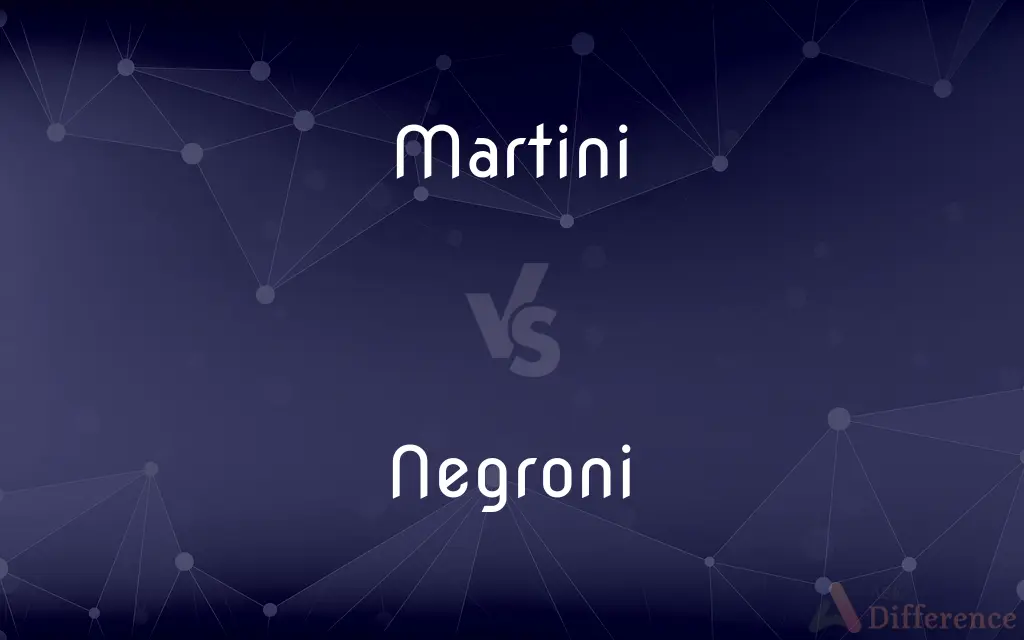Martini vs. Negroni — What's the Difference?
By Fiza Rafique & Urooj Arif — Updated on March 15, 2024
A Martini is a cocktail typically made with gin and dry vermouth, often garnished with an olive or a lemon twist. A Negroni is a cocktail consisting of gin, sweet vermouth, and Campari, usually garnished with an orange peel.

Difference Between Martini and Negroni
Table of Contents
ADVERTISEMENT
Key Differences
A Martini is characterized by its simplicity and elegance, typically consisting of gin (or sometimes vodka) and dry vermouth, allowing for variations in dryness depending on the ratio. It's often garnished with an olive or a lemon twist to add a subtle flavor or aroma. On the other hand, a Negroni offers a bolder taste, with equal parts gin, sweet vermouth, and Campari, resulting in a balance of sweet, bitter, and botanical flavors, garnished with an orange peel to complement its complex profile.
The origin of the Martini is somewhat debated but is believed to have emerged in the United States in the late 19th century. It has evolved into various styles, including the Dry Martini, with minimal vermouth, and the Dirty Martini, which includes olive brine. In contrast, the Negroni has a more straightforward origin story, credited to Count Camillo Negroni in Florence, Italy, in the 1920s, who asked for a stronger version of the Americano cocktail by substituting soda water with gin.
When it comes to serving, Martinis are usually presented in a stemmed Martini glass, chilled but with no ice in the glass, emphasizing its clear, refined appearance. Negronis, however, are often served either on the rocks in an old-fashioned glass or straight up, highlighting its deep, red-orange hue, which visually distinguishes it from the Martini's typically clear or slightly yellowish color.
The choice between a Martini and a Negroni might also reflect a drinker's preference for either dry or sweet and bitter flavors. A Martini, with its variable ratio of gin to vermouth, caters to those who appreciate a drier, more subtle cocktail experience. Conversely, a Negroni, with its fixed ratio and inclusion of Campari, appeals to those looking for a cocktail with a richer, more complex taste profile.
The Martini has become synonymous with sophistication and class, partly thanks to its association with iconic figures like James Bond. The Negroni, while perhaps less entrenched in popular culture, has gained a reputation as a classic cocktail that signifies a knowledge and appreciation of traditional Italian aperitivos.
ADVERTISEMENT
Comparison Chart
Main Ingredients
Gin (or vodka) and dry vermouth.
Gin, sweet vermouth, and Campari.
Garnish
Olive or lemon twist.
Orange peel.
Taste Profile
Dry, with variations depending on vermouth ratio.
Balanced between sweet, bitter, and botanical flavors.
Origin
United States, late 19th century.
Florence, Italy, 1920s.
Serving Style
Typically served in a stemmed Martini glass, no ice.
Served on the rocks or straight up, in an old-fashioned glass.
Compare with Definitions
Martini
Known for its simplicity and sophistication.
The Martini's elegance is in its minimalistic approach.
Negroni
Offers a complex blend of sweet and bitter tastes.
The Negroni's appeal lies in its unique bitter-sweet balance.
Martini
Symbolizes sophistication and class.
The Martini has become a cultural icon of elegance.
Negroni
Characteristically garnished with an orange peel.
The orange peel adds a citrusy aroma to the Negroni.
Martini
Often garnished with an olive or lemon twist.
A Martini isn't complete without its signature olive.
Negroni
A balanced mix of gin, sweet vermouth, and Campari.
He discovered his love for Negronis during his trip to Italy.
Martini
A refined mix of gin and dry vermouth.
She ordered a Martini with a twist to start the evening.
Negroni
Part of the classic cocktail revival.
The Negroni has enjoyed a resurgence in popularity among cocktail aficionados.
Martini
Adjustments in gin to vermouth ratio affect dryness.
He prefers his Martini extra dry, with only a hint of vermouth.
Negroni
Known for its rich, aromatic profile.
A Negroni is a bold choice that speaks to a refined palate.
Martini
A cocktail made of gin or vodka and dry vermouth.
Negroni
The Negroni is a popular Italian cocktail, made of one part gin, one part vermouth rosso (red, semi-sweet), and one part Campari, garnished with orange peel. It is considered an apéritif.
Martini
A cocktail made with gin or vodka and vermouth.
Will you join us at six o’clock for martinis?
My boss is out on another of his three-martini lunches.
Negroni
A cocktail made of gin, sweet vermouth, and bitters, often garnished with a lemon or orange peel.
Martini
Any cocktail served in a cocktail glass, often sweet or fruity and aimed at women.
I love the chocolate martinis at Trendy Bar!
Negroni
A cocktail consisting of gin, Campari and vermouth.
Martini
A cocktail made of gin (or vodka) with dry vermouth
Common Curiosities
What makes a Martini dry?
A Martini is made dry by reducing the amount of vermouth relative to gin.
Can you make a Martini with vodka?
Yes, a Vodka Martini substitutes gin with vodka for a different flavor profile.
What is the best way to serve a Martini?
Traditionally, a Martini is served chilled, without ice, in a stemmed Martini glass.
Is a Negroni always served on the rocks?
A Negroni can be served on the rocks or straight up, depending on preference.
How does the taste of a Martini compare to a Negroni?
A Martini tends to be drier and more subtle, while a Negroni offers a richer, bittersweet flavor.
What is the significance of the Negroni's garnish?
The orange peel garnish adds a citrus aroma that complements the Negroni's complex flavors.
Why is the Martini considered a symbol of sophistication?
Its association with iconic figures and its elegant presentation have made the Martini a symbol of sophistication.
Can the ingredients of a Negroni be varied?
The classic Negroni recipe is quite specific, but variations exist, like the White Negroni.
How did the Negroni get its name?
It's named after Count Camillo Negroni, who is credited with inventing the cocktail.
Is there a non-alcoholic version of these cocktails?
Non-alcoholic versions can be made using non-alcoholic substitutes for gin, vermouth, and Campari.
Share Your Discovery

Previous Comparison
Jenny vs. Jack
Next Comparison
Hemp vs. SisalAuthor Spotlight
Written by
Fiza RafiqueFiza Rafique is a skilled content writer at AskDifference.com, where she meticulously refines and enhances written pieces. Drawing from her vast editorial expertise, Fiza ensures clarity, accuracy, and precision in every article. Passionate about language, she continually seeks to elevate the quality of content for readers worldwide.
Co-written by
Urooj ArifUrooj is a skilled content writer at Ask Difference, known for her exceptional ability to simplify complex topics into engaging and informative content. With a passion for research and a flair for clear, concise writing, she consistently delivers articles that resonate with our diverse audience.














































